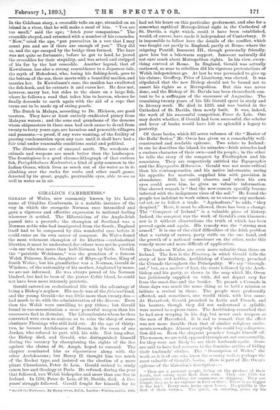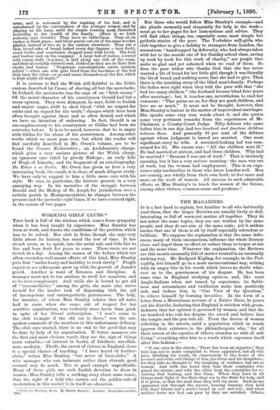GIRALDUS CAMBRENSIS.* GERALD of Wales, now commonly known by his
Latin name of Giraldus Cambrensis, is a notable instance of the way in which the energetic Norman race intensified and gave a vigorous and effective expression to national feeling wherever it settled. The Hibernicism of the Anglo-Irish passed into a proverb ; the champion of Scotland was a Norman noble who had immigrated from the South ; England itself had to be conquered by this wonderful race before it could enter on its own career of conquest. So Wales found the most vehement champion of its liberties—ecclesiastical liberties, it must be understood, for others were not in question —in one who was more than half-Norman by birth. Gerald, the "patriotic Welshman," was the grandson of a famous Welsh Princess, Nesta, daughter of Rhys-ap-Tudor, King of South Wales ; but his grandfather was a Norman, Gerald de Windsor; of the nationality of his mother, Angharad by name, we are not informed. He was always proud of his Norman kindred, but had he been of the purest Celtic blood, he could not have been more intensely patriotic.
Gerald entered on ecclesiastical life with the advantage of being a Bishop's nephew. His uncle was of the fainéant kind, and the young Gerald—he was little more than twenty-five— had much to do with the administration of the diocese. Even then the Welsh were unwilling to pay tithes ; but Gerald found in excommunication a more powerful weapon than his successors find in distraint. The Liberationists whom he thus converted were even so zealous as to seize the sheep of some obstinate Flemings who still held out. At the age of thirty- two, he became Archdeacon of Brecon, in the room of one Jordan, who refused to part with his wife. Not long after, the Bishop died, and Gerald, who distinguished himself during the vacancy by championing the rights of the See against the claims of St. Asaph, hoped to succeed. The chapter nominated him as dignissimus along with the other Archdeacons ; but Henry II. thought him too much of the Becket type, and insisted on the election of a more pliant Churchman, Peter de Leia. Gerald retired to study canon law and theology at Paris. He refused, during the year that followed, two Welsh bishoprics and more than one See in Ireland. In 1198, Peter de Leia, of St. Davids, died. A five- years' struggle followed. Gerald fought for himself, for he
• Gerald the Weishman. By Henry Owen, B.C.L. London : Whiting and Co. 1869. had set his heart on this particular preferment, and also for a somewhat mythical Metropolitical right in the Cathedral a St. Davids, a right which, could it have been established, would, of course, have made it independent of Canterbury. It is impossible to follow here the details of the conflict, which was fought out partly in England, partly at Rome, where the reigning Pontiff, Innocent m., though personally friendly, gave him but a lukewarm support. Innocent naturally did
not care much about Metropolitan rights. In his view, every- thing centred at Rome. In England, Gerald was actually outlawed, so near to rebellion did his vigorous protestations of
Welsh independence go. At last he was persuaded to give up his claims ; Geoffrey, Prior of Llanthony, was elected. It WS&
stipulated that the new Bishop should not be bound not to assert his rights as a Metropolitan. But this was never done, and the Bishop of St. Davids has been thenceforth con- tent to be a suffragan of the successor of Augustine. The- remaining twenty years of his life Gerald spent in study and in literary work. He died in 1223, and was buried in the Cathedral of St. Davids, then newly built. It was, indeed, the work of his successful competitor, Peter de Leia. One may doubt whether, if Gerald had been successful, the scholar and lover of books would have left so splendid a legacy to posterity.
Of these books, which fill seven volumes of the "Master of the Rolls' Series," Mr. Owen has given us a remarkably well- constructed and readable epitome. Two relate to Ireland : in one he describes the island, its miracles—Irish miracles had a curious character of their own—and its people ; in the other he tells the story of the conquest by FitzStephen and his associates. They are respectively entitled the Topographia and the Expugnatio Hiberniea. Gerald was not more critical than his contemporaries, and his native informants, seeing his appetite for marvels, supplied him with provision in_ abundance. Still, he could observe, and when his own eyes could serve him, he gives us valuable information. One shrewd remark is "that the new-comers speedily become infected with the indigenous vices of the soil." He found the people too indolent to work mines, or to exercise any mechani- cal art, or to follow a trade. "Agriculture," he adds, "they despised." Here, it must be allowed, there has been a change. The "'Conquest of Ireland" is a valuable piece of history.
Indeed, the conquest was the work of Gerald's own kinsmen ;. nor is it without observations the truth of which has been proved again and again. His remedy was the "strong man armed." It is one of the chief difficulties of the Irish problem that a variety of causes, party strife on the one hand, and the growth of a national conscience on the other, make this remedy more and more difficult of application.
The books on Wales are even more valuable than those on Ireland. The first is the Itinerary, in which Gerald tells the story of how Baldwin, Archbishop of Canterbury, preached the Crusade throughout the Principality. We say "through- out;" but, as a matter of fact, the route followed by the Arch- bishop and his party, as shown in the map which Mr. Owen has judiciously supplied us with, did not depart very far from the coast-line and the border. To preach a Crusade in those days was much the same thing as to bold a mission or initiate a revival in these. The people were profoundly affected, and sometimes, one would think, with less cause.
At Haverford, Gerald preached in Latin and French, and his hearers, though they did not understand a syllable, were moved to copious tears. The Archbishop remarked that he had seen weeping in his day, but never such weepers as the men of Haverford. It is sad to remark that the effect was not more durable than that of similar religious excite- ments nowadays. Almost everybody who could buy a dispensa- tion did so. Even the eloquent preacher bought himself off.
The women, we are told, opposed throughout, not unreasonably, for they were not likely to see their husbands again. Some are said to have had recourse to the feminine artifice of hiding their husbands' clothes. The "Description of Wales," the work as it is of one who knew the country well, is perhaps the most valuable of Gerald's books. Here is part of Mr. Owen's
epitome of the historian's description :—
"They are a pastoral people, living on the produce of their herds, and eating more flesh than corn. They care little for agriculture, and nothing for commerce or shipping. They are frugal; they go to no expense in food or dress. There is no beggar in the land. Every man keeps open house. Hospitality is the first of their virtues. The guest, on entering, gives up his
arms, and is welcomed by the washing of his feet, and is entertained by the conversation of the younger women, and by playing on the harp, until the simple evening meal, furnished according to the wealth of the family. (Here is no Irish jealousy, says Gerald.) They have no table-linen. They sit on rushes or fresh grass ; and three guests eat out of the same wooden platter, instead of two, as is the custom elsewhere. They eat a thin, broad cake of bread, baked every day (lagana = bara sweet herbs, and sometimes chopped meat with broth. The host and hostess wait on the company. A large bed of rushes, covered With coarse cloth (brychan), is laid along one side of the room, and they all sociably retire to rest, clothed as they are in their thin cloaks and tunics. Propinquo concubantium calore multum adjuti '—when one side gets tired from the hardness of the bed they turn the other—or go and warm themselves at the fire, which is kept alight all night."
It is curious to find the Welsh still faithful to the Celtic custom described by Ctesar, of shaving all but the moustache. In Ireland, the moustache was the sign of an "Irish enemy."
Of the moral character of his countrymen Gerald had but a mean opinion. They were dishonest, he says, liable to foolish and unjust anger, swift to shed blood, "with no respect for oaths and no regard for the truth," charges which have been often brought against them and as often denied, and which we have no intention of endorsing. In fact, Gerald is as uncomplimentary to his countrymen as Gildas had been six centuries before. It is to be noted, however, that he is angry with Gildas for his abuse of his countrymen. Among other works which we must pass over, but which the reader will find carefully described in Mr. Owen's volume, are to be found the Gen:ma Ecclesiastica ; an Archdeacon's charge, which gives a very curious picture of the Welsh clergy, an ignorant race ruled by greedy Bishops ; an early Life of Hugh of Lincoln ; and the fragment of an autobiography, De Rebus a se Gestis. Mr. Owen has given us here a very interesting book, the result, it is clear, of much diligent study.
We have only to suggest to him a little more care with his style. He uses, in particular, the historic present in a very annoying way. In his narrative of the struggle between Gerald and the Bishop of St. Asaph for jurisdiction over a certain parish in Montgomeryshire, he changes between the present and the preterite eight times, if we have counted right, in the course of two pages.



































 Previous page
Previous page